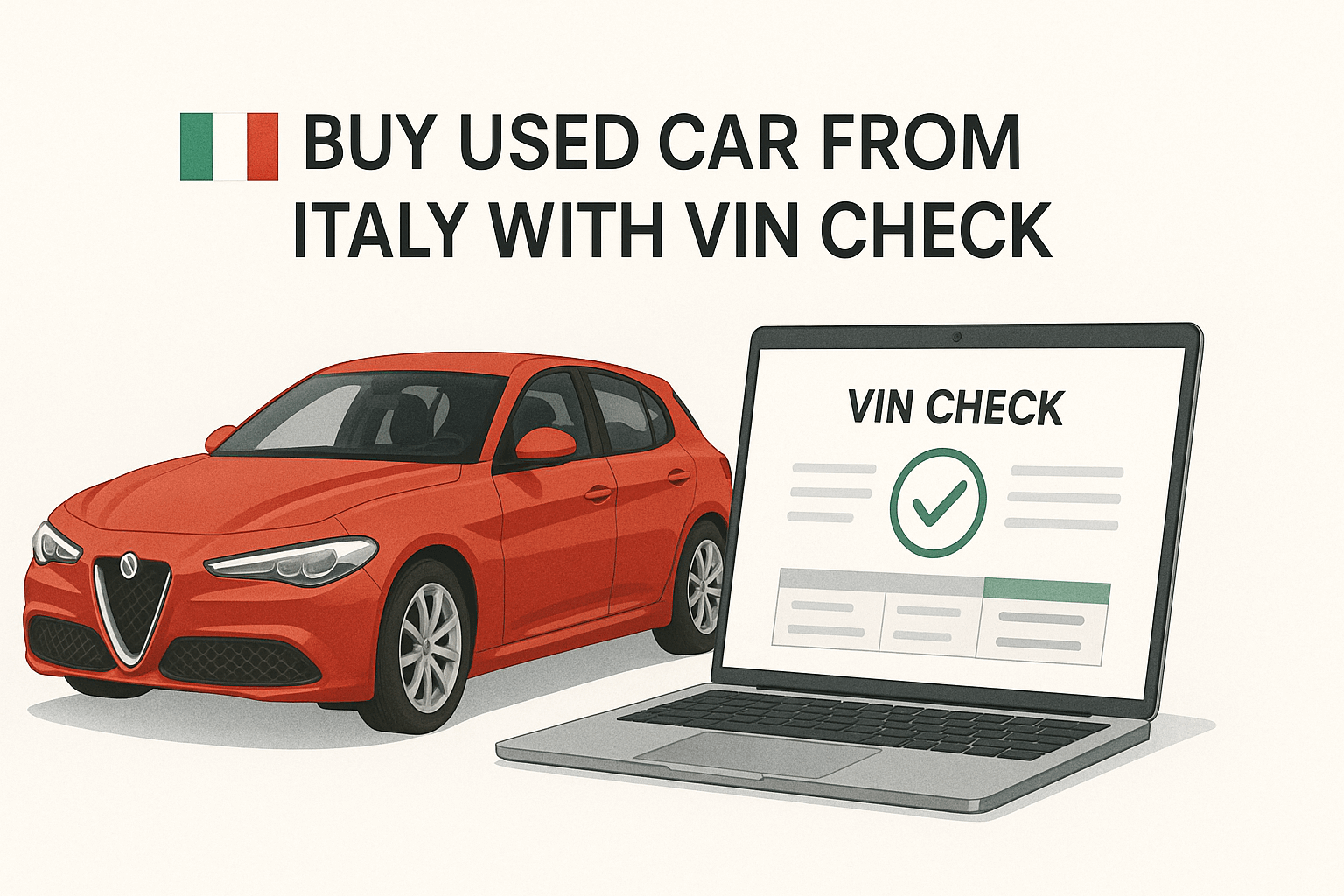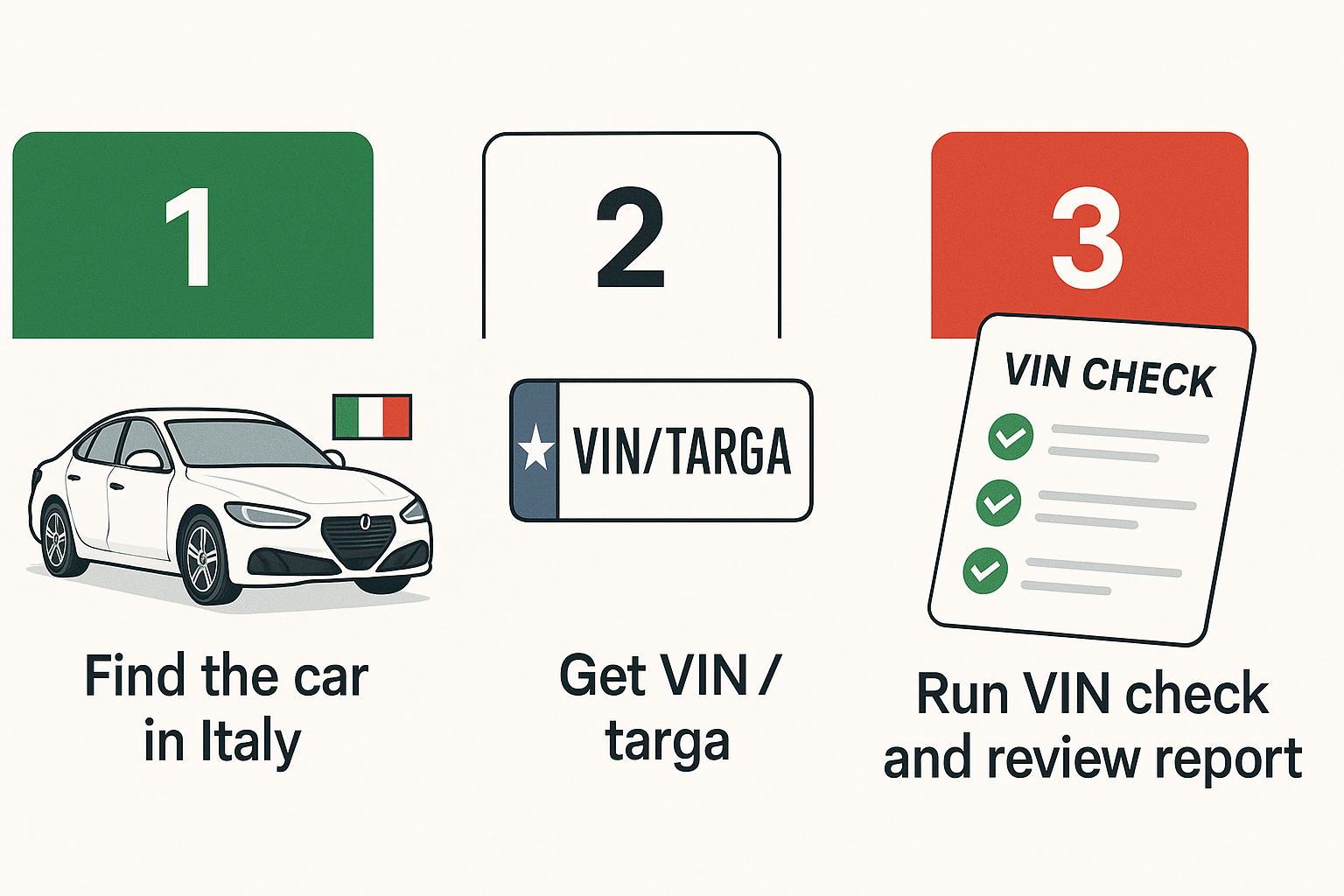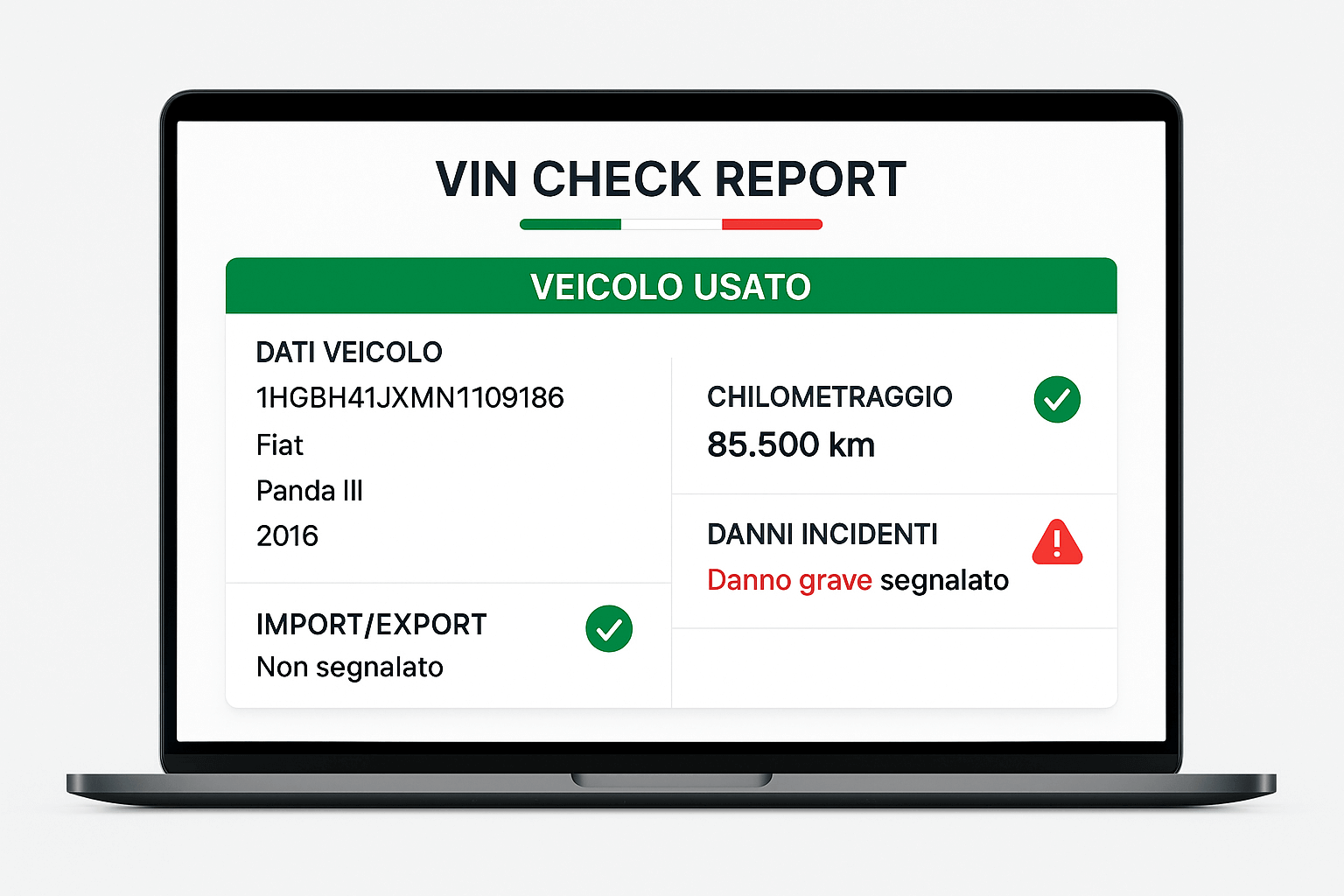
Instant VIN Check ITALY 🇮🇹 – Reveal a Car’s Full History Before You Buy
Use VIN Check Italy to shows vehicle information to give you an idea of the car’s history before buying. You can check the specs, accidents, mileage history and market value. There are also pretty detailed equipment options to explore.
Example VIN: WBA11AW090FN15037 or Number Plate: GB257RN
(1462+ check reviews)
Buying a Used Car from Italy and Checking the VIN: A Complete Q&A Guide
Buying a used car from Italy can be a smart move: Italian markets are rich with well-kept city cars, desirable European models, and competitive pricing. But international purchases come with extra homework—chief among them, running a VIN (Vehicle Identification Number) check and verifying Italian paperwork. Below is a practical, expert-backed Q&A that walks you through the process, with examples, checklists, and trusted resources.

What is a VIN—and why does it matter for Italian imports?
Q: What exactly is a VIN and why is it critical when buying a car from Italy?
A: A VIN is a unique 17-character code that identifies a specific vehicle—like a fingerprint for cars. Decoding it confirms the vehicle’s make, model, year, engine, and ties that identity to safety recalls, inspection records, and potential red flags (accidents, theft, mileage anomalies).
Pro tip: You’ll typically find the VIN on:
The dashboard (viewable through the windshield)
Inside the driver’s door jamb
The engine bay or chassis stamp
The registration documents (Carta di Circolazione / Documento Unico)
What official Italian records can I check before I buy?
Q: What public records exist in Italy to verify a used vehicle?
A: Italy maintains the PRA (Pubblico Registro Automobilistico), managed by the Automobile Club d’Italia (ACI). Two especially useful documents are:
Visura PRA (Visurenet): Confirms legal status, liens, and ownership history tied to a plate/VIN. It’s the authoritative starting point for Italian vehicles. aci.gov.it
Estratto Cronologico: A chronological extract showing all recorded events (ownership changes, liens, administrative blocks) for the vehicle. ACI Automobile Club d’Italia
You can also verify inspection (revisione) records—helpful for mileage consistency—via the Italian government’s Portale dell’Automobilista (revisions after 1 June 2018). ilportaledellautomobilista.it+2ilportaledellautomobilista.it+2
How big is the odometer-tampering risk when importing from the EU?
Q: Is mileage fraud a real problem?
A: Unfortunately yes. The European Parliament has documented odometer manipulation as a widespread issue across Member States, affecting second-hand markets EU-wide. This is exactly why cross-checking PRA + revision records + a VIN history report is so important. European Parliament+1
What does a thorough Italy-focused VIN check include?
Q: What should I expect from a good VIN report?
A: At minimum, look for:
Identity & specs: exact model, engine code, trim
Registration & ownership events: PRA matches and history
Revision (inspection) history: dates, recorded mileage
Accident/damage indicators: insurance or repair entries
Theft checks: cross-border database flags (where available)
Recall status: outstanding safety recalls (check the EU or national recall portals)
For Italian/EU cars, serious providers also triangulate EUCARIS-connected data flows that enable cross-border vehicle information exchange for re-registration and checks. kba.de+1
How do I check recalls for an Italian car?
Q: Where can I verify safety recalls using the VIN?
A: Use the manufacturer’s recall page or a national authority portal. For EU-market vehicles, Germany’s KBApublishes recall information; for globally imported cars (e.g., US imports now in Italy), the NHTSA VIN recall tool is also useful.
KBA recalls: policy info and recall handling in the EU context. kba.de
NHTSA VIN recall look-up (relevant for US-spec imports). vinrcl.safercar.gov+1
You can also see recalls broadcast via the EU Safety Gate rapid alert system (top-down EU notifications for dangerous products, including vehicle alerts). European Commission
What’s the step-by-step process to vet a car in Italy before I pay?
Q: Give me a fast, practical workflow.
A:
Collect identifiers: VIN + license plate (targa).
Run a PRA search (Visurenet) to validate ownership, encumbrances, and legal status. Then consider an Estratto Cronologico for a deeper, time-stamped history. aci.gov.it+1
Check “Revisione” history (post-2018) on Portale dell’Automobilista and compare mileages with the ad/invoice. Discrepancies are red flags. ilportaledellautomobilista.it+1
Run a comprehensive VIN report (EU-wide) for accident/theft/previous registrations—and to identify if the car was imported earlier from another country. (EUCARIS context). kba.de
Verify recalls through manufacturer/KBA (EU) or NHTSA (if US import). kba.de+1
Match documents: VIN on vehicle, documento unico, sales contract, and seller’s ID.
Pre-purchase inspection (PPI): Have an independent mechanic inspect the car in Italy before you transfer funds.
Bold rule of thumb: If the mileage history, ownership chain, or VIN positions don’t align perfectly—walk away.
Example & case study: A tale of two buyers
Q: What does success vs. failure look like?
A:
Buyer A (skips due diligence): Sees an attractive Alfa Romeo Giulia in Milan at a below-market price. Pays a deposit, then discovers at home the revisione mileage (public since 2018) was higher two years ago than today. Result: odometer rollback → resale value destroyed → legal hassle. ilportaledellautomobilista.it
Buyer B (follows the steps): Uses Visurenet, obtains an Estratto Cronologico, checks revisione, and runs an EU VIN report. A prior insurance total-loss in another EU country shows up, plus an open airbag recall → buyer exits the deal and saves thousands. aci.gov.it+2ACI Automobile Club d’Italia+2
What documents will I need if I export the car from Italy?
Q: I’m not registering it in Italy; I’m exporting it. What should I know?
A: You’ll generally need:
Original registration (Carta di Circolazione / Documento Unico)
Proof of ownership / invoice
Seller’s ID and a proper sales contract
Deregistration for export and temporary transit plates/insurance (if you’ll drive it out)
Customs/VAT paperwork if moving it outside the EU (consult local customs) adm.gov.it
On eventual re-registration in another EU country, vehicle information is often checked across borders via EUCARIS / Once-Only Technical System connections, streamlining administrative verification. European Commission
Free vs. paid checks: which should I use?
Q: Can I do it all for free?
A: Free tools (PRA look-ups may have fees; official recall searches are typically free) cover basics like recall status and public revision mileage (post-2018). A paid, multi-database VIN report usually adds:
Damage/total-loss indicators from insurers
Cross-border registration footprints
Theft checks and market valuation context
In practice: Use official Italian sources first, then buy a full VIN report before you pay a deposit.
What are the top mistakes to avoid?
Skipping the PRA/Estratto Cronologico: You could miss liens or administrative stops. ACI Automobile Club d’Italia
Not comparing revisione mileages to the ad’s odometer claim. ilportaledellautomobilista.it
Ignoring recalls: unresolved safety issues can be costly or dangerous. kba.de
Paying in full without a PPI: Always get an independent inspection.
Quick checklist before sending money
VIN consistency across car, chassis stamp, and documents
PRA Visura + (ideally) Estratto Cronologico obtained and reviewed aci.gov.it+1
Revisione history checked; mileage makes sense ilportaledellautomobilista.it
EU/Global VIN report reviewed (accident/theft/import/export) kba.de
Recalls checked (KBA/manufacturer; NHTSA for US imports) kba.de+1
Independent PPI completed
Payment only via secure, documented methods
Useful resources and videos
ACI – Visurenet (PRA search): official legal/ownership status. aci.gov.it
ACI – Estratto Cronologico: chronological ownership/events extract. ACI Automobile Club d’Italia
Portale dell’Automobilista – Revisione: periodic inspections and post-2018 mileage listing. ilportaledellautomobilista.it
European Parliament – Odometer manipulation studies: scope of EU problem and policy proposals. European Parliament+1
KBA (Germany) – Recalls: EU-market recall oversight example. kba.de
NHTSA – VIN recall look-up: relevant for US-spec imports in Italy/EU. NHTSA
YouTube (helpful overviews):
FAQ
1. Where do I find an Italian car’s VIN?
On the dashboard, door jamb, the engine/chassis, and on the Documento Unico.
4. How do recalls work for cars bought in Italy?
Check the manufacturer portal and EU/National authorities (e.g., KBA) with your VIN. For US-spec imports, use NHTSA’s tool. kba.de+1
2. Can I verify mileage in Italy?
Yes—check revisione entries (post-June 2018) on the Portale dell’Automobilista and compare to the odometer and service invoices. ilportaledellautomobilista.it
5. Are EU VIN checks connected across borders?
Public authorities use systems like EUCARIS to share data for re-registration and verification, improving cross-border transparency. kba.de+1
3. What is the PRA and why is it important?
It’s Italy’s public vehicle registry. A Visura PRA and Estratto Cronologico confirm legal status, liens, and ownership history—essential before payment. aci.gov.it+1
6. What if the revisione mileage is lower now than years ago?
That’s a classic rollback red flag—step away or investigate deeply with a full VIN report and documentation. European Parliament
Conclusion & Call to Action
Buying a used car from Italy is safe and rewarding—if you follow a methodical process. Start with official Italian sources (PRA/Estratto Cronologico + Revisione), add a comprehensive VIN history report, verify recalls, and finish with a pre-purchase inspection. This layered approach protects you from odometer fraud, hidden damage, liens, and registration surprises.
Ready to move forward?
Gather the VIN and plate, run an ACI Visura and revisione check, then order a full EU VIN report before sending any money.
If everything aligns, schedule a PPI, finalize paperwork, and enjoy your Italian import—with confidence.
Decode before you decide. A 10-minute check can save you thousands.
VINSPY Checker
VINSPY.eu offers VIN code checking service for Europe vehicles
Contact
Email: info@vinspy.eu

